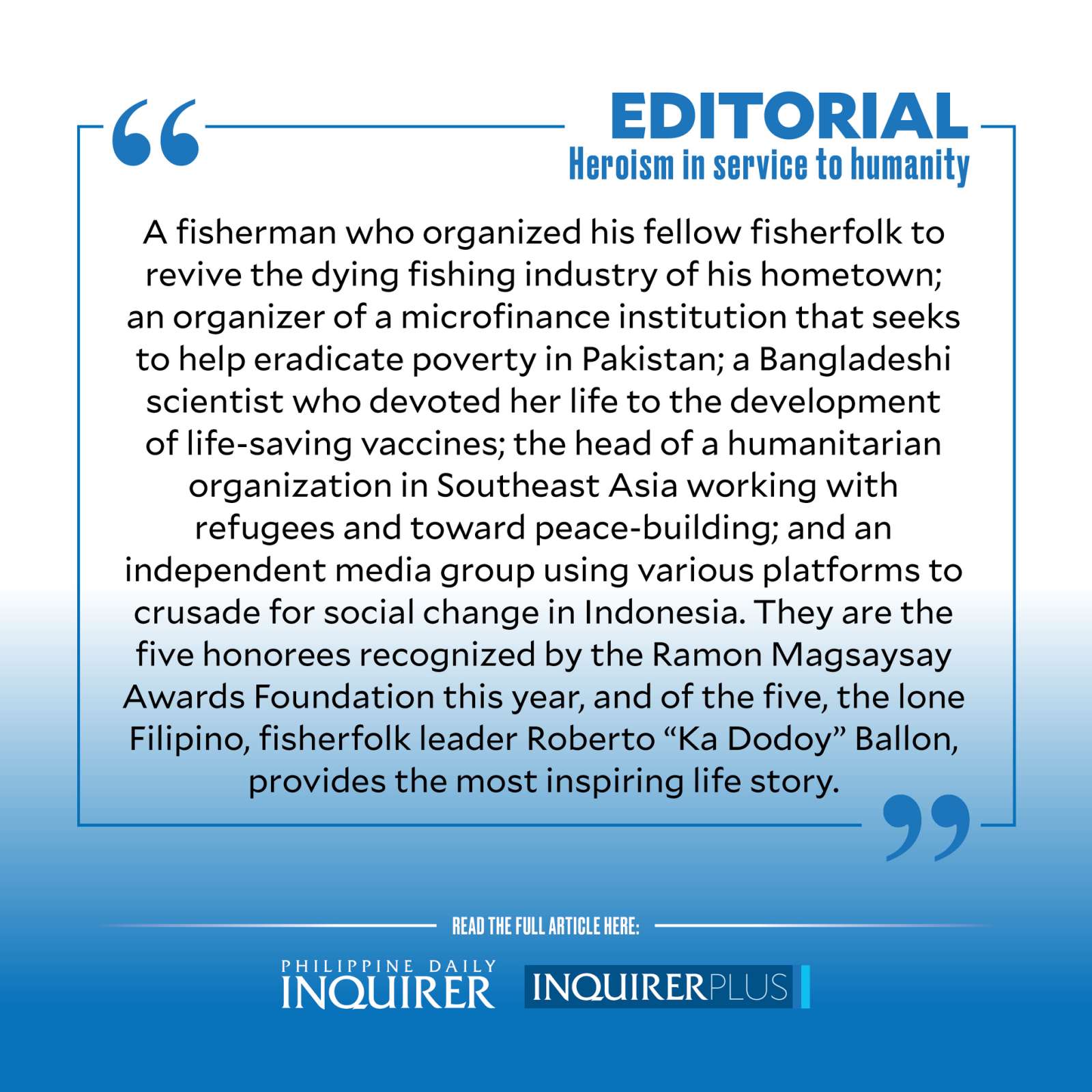
A fisherman who organized his fellow fisherfolk to revive the dying fishing industry of his hometown; an organizer of a microfinance institution that seeks to help eradicate poverty in Pakistan; a Bangladeshi scientist who devoted her life to the development of life-saving vaccines; the head of a humanitarian organization in Southeast Asia working with refugees and toward peace-building; and an independent media group using various platforms to crusade for social change in Indonesia.
They are the five honorees recognized by the Ramon Magsaysay Awards Foundation this year for being “solution builders when it comes to important yet ‘complex’ problems their societies faced.”
Of the five, the lone Filipino, fisherfolk leader Roberto “Ka Dodoy” Ballon, provides the most inspiring life story. His accomplishment, despite his humble stature in life, illustrates, said the Foundation, “how everyday acts of heroism can truly be extraordinary and transformative.”
One can’t be more “everyday” than Ka Dodoy, who together with 30 of his fellow fisherfolk started the Kapunungan sa Gamay nga Mangingisda sa Concepcion (KMGC) in 1986 in his hometown of Kabasalan, Zamboanga Sibugay. Their goal was simple but extremely challenging: to put a stop to the conversion of the once-lush mangrove forests into fish ponds that drastically cut their fish harvests and led to the gradual destruction of the marine environment.
Dedicating his award to his fellow fishers, especially the small fisherfolk, Ballon said he hoped that the award would win more recognition of and support for their programs.
Born to migrants from the Visayas searching for richer fishing grounds, Ballon says he saw how the “once-teeming waters of his town gradually suffered the effects of rampant fishpond conversion and mangrove loss.” After the founding of KMGC, with the support of local government officials and nongovernment organizations, Ballon and his colleagues were able “to transform a swath of abandoned fishponds into a lush mangrove forest.” The group, which now counts over 300 members, also introduced other sustainable livelihood initiatives like oyster production, shell and crab culture, and seaweed farming, thereby transforming Kabasalan into an ecotourism destination.
As a result, the local fishers’ catch improved fourfold, from 1.5 kilos of fish from an eight-hour trip, to 7 kilos in three to five hours of fishing. A report notes that households in the village were soon able to afford boats and send their children to school.
Vice President Leni Robredo, who met Ka Dodoy after a documentary on him won best film in the VP’s 2019 film festival on inspiring stories of human development, also cited Ballon and KMGC for “sharing their knowledge selflessly to other communities,” including fishers in her home province of Camarines Sur.
It is this same spirit of daring and determination, inspiration and generosity, that seems to have marked the public lives of the other Magsaysay awardees.
Steven Muncy, who heads Community and Family Service International, is a familiar face to Filipinos especially to those working on peace in Mindanao. He was cited for his “life-long dedication to humanitarian work, refugee assistance, and peace building.”
Firdausi Qadri of Bangladesh was recognized for her work with Bangladeshi scientists, especially women, and for her “untiring contributions to vaccine development, advanced biotechnological therapeutics and critical research that has been saving millions of precious lives.”
Muhammad Amjad Saqib was honored for his dedication to create the largest microfinance institution in Pakistan, anchored on his “inspiring belief that human goodness and solidarity will find ways to eradicate poverty.”
For “Emerging Leadership in an Organization,” the documentary production group Watchdoc from Indonesia was lauded for using investigative journalism, documentary filmmaking, and digital technology “in its effort to transform Indonesia’s media landscape.”
The five laureates, from a simple fisherman to a businessman, from a scientist to an international humanitarian, to a fledgling group of journalists, are all shining exemplars of dedication to humanity and human ideals. These are the same ideals that fueled the life of service of the late President Ramon Magsaysay, after whom the awards are named, who lives on in the awardees, past and present (and the future, it is hoped), who serve the least and the last in the spirit of our shared humanity. They are good news in our current landscape of uncertainty, loss, and bereavement. Antidotes to the prevailing sense of futility and despair, they are indeed heroes in a world sorely lacking heroism.

